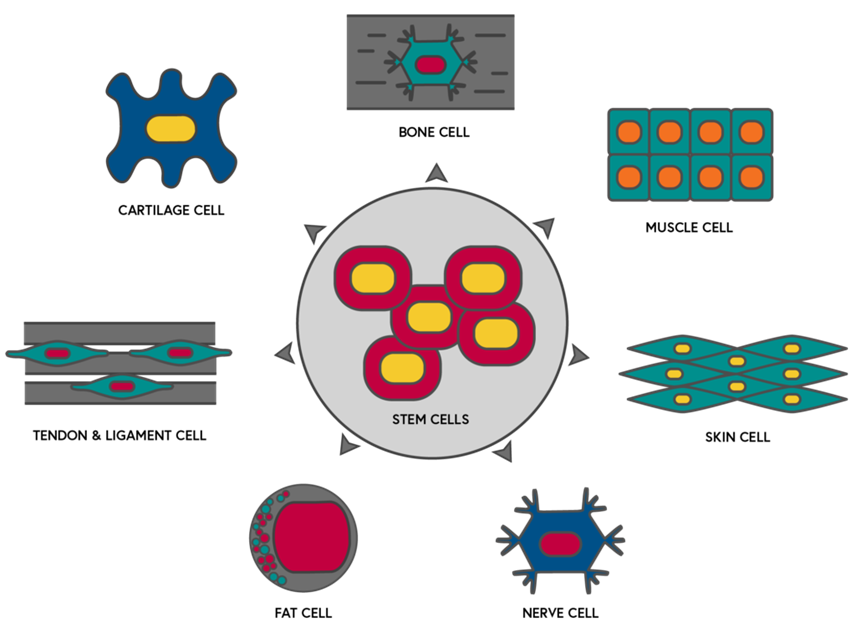- You are here: Home
- Applications
- Cell Therapy
- Stem cell therapy
Applications
-
Cell Services
- Cell Line Authentication
- Cell Surface Marker Validation Service
-
Cell Line Testing and Assays
- Toxicology Assay
- Drug-Resistant Cell Models
- Cell Viability Assays
- Cell Proliferation Assays
- Cell Migration Assays
- Soft Agar Colony Formation Assay Service
- SRB Assay
- Cell Apoptosis Assays
- Cell Cycle Assays
- Cell Angiogenesis Assays
- DNA/RNA Extraction
- Custom Cell & Tissue Lysate Service
- Cellular Phosphorylation Assays
- Stability Testing
- Sterility Testing
- Endotoxin Detection and Removal
- Phagocytosis Assays
- Cell-Based Screening and Profiling Services
- 3D-Based Services
- Custom Cell Services
- Cell-based LNP Evaluation
-
Stem Cell Research
- iPSC Generation
- iPSC Characterization
-
iPSC Differentiation
- Neural Stem Cells Differentiation Service from iPSC
- Astrocyte Differentiation Service from iPSC
- Retinal Pigment Epithelium (RPE) Differentiation Service from iPSC
- Cardiomyocyte Differentiation Service from iPSC
- T Cell, NK Cell Differentiation Service from iPSC
- Hepatocyte Differentiation Service from iPSC
- Beta Cell Differentiation Service from iPSC
- Brain Organoid Differentiation Service from iPSC
- Cardiac Organoid Differentiation Service from iPSC
- Kidney Organoid Differentiation Service from iPSC
- GABAnergic Neuron Differentiation Service from iPSC
- Undifferentiated iPSC Detection
- iPSC Gene Editing
- iPSC Expanding Service
- MSC Services
- Stem Cell Assay Development and Screening
- Cell Immortalization
-
ISH/FISH Services
- In Situ Hybridization (ISH) & RNAscope Service
- Fluorescent In Situ Hybridization
- FISH Probe Design, Synthesis and Testing Service
-
FISH Applications
- Multicolor FISH (M-FISH) Analysis
- Chromosome Analysis of ES and iPS Cells
- RNA FISH in Plant Service
- Mouse Model and PDX Analysis (FISH)
- Cell Transplantation Analysis (FISH)
- In Situ Detection of CAR-T Cells & Oncolytic Viruses
- CAR-T/CAR-NK Target Assessment Service (ISH)
- ImmunoFISH Analysis (FISH+IHC)
- Splice Variant Analysis (FISH)
- Telomere Length Analysis (Q-FISH)
- Telomere Length Analysis (qPCR assay)
- FISH Analysis of Microorganisms
- Neoplasms FISH Analysis
- CARD-FISH for Environmental Microorganisms (FISH)
- FISH Quality Control Services
- QuantiGene Plex Assay
- Circulating Tumor Cell (CTC) FISH
- mtRNA Analysis (FISH)
- In Situ Detection of Chemokines/Cytokines
- In Situ Detection of Virus
- Transgene Mapping (FISH)
- Transgene Mapping (Locus Amplification & Sequencing)
- Stable Cell Line Genetic Stability Testing
- Genetic Stability Testing (Locus Amplification & Sequencing + ddPCR)
- Clonality Analysis Service (FISH)
- Karyotyping (G-banded) Service
- Animal Chromosome Analysis (G-banded) Service
- I-FISH Service
- AAV Biodistribution Analysis (RNA ISH)
- Molecular Karyotyping (aCGH)
- Droplet Digital PCR (ddPCR) Service
- Digital ISH Image Quantification and Statistical Analysis
- SCE (Sister Chromatid Exchange) Analysis
- Biosample Services
- Histology Services
- Exosome Research Services
- In Vitro DMPK Services
-
In Vivo DMPK Services
- Pharmacokinetic and Toxicokinetic
- PK/PD Biomarker Analysis
- Bioavailability and Bioequivalence
- Bioanalytical Package
- Metabolite Profiling and Identification
- In Vivo Toxicity Study
- Mass Balance, Excretion and Expired Air Collection
- Administration Routes and Biofluid Sampling
- Quantitative Tissue Distribution
- Target Tissue Exposure
- In Vivo Blood-Brain-Barrier Assay
- Drug Toxicity Services
Stem cell therapy
Regenerative medicine aims to replace or repair human cells, or regenerate tissue or organs to restore normal function. It makes use of cells, biomaterials, and molecules to fix tissues in the body that do not function properly because of disease or injury. What makes regenerative medicine different from conventional treatment is that the latter generally treat symptoms, while the former aims to treat the root cause of a patient's condition by replacing dysfunction cells or organs, even by fixing a faulty gene.
This technology combines the latest advances in stem cell biology, embryology, tissue engineering and medicine to develop products for the replacement, restoration or regeneration of damaged or diseased cells and tissues. Tools used in regenerative medicine include biomaterials and extracellular matrices, lab-generated cells and tissues, and reagents required in the treatment process. These powerful technologies and tools are allowing clinical scientists to engineer and provide healthy cells, tissues and organs to patients with chronic degenerative diseases.

Workflow—Related products
Stem cell products
- Embryonic & Induced Pluripotent Stem Cells
- Neural Stem Cells
- Mesenchymal Stem Cells
- Hematopoietic Stem Cells
- Cancer Stem Cells
Cell collection
- Cell Isolation Kit
- Cell Freezing Medium
Cell culture
- Medium (Liquid/Powder)
- Cytokines and Growth factors
- cGMP Stem cell compounds
- Lipofectamine transfection reagents
Cell verification
- Immunocytochemistry Kit
- Antibody Panel
- Functional Identification Kit
Cell function
- Mycoplasma Detection Kit
- Endotoxin quantitation kit
- Cell Proliferation Kit
- Cell Viability Kit
- Imaging dyes
Creative Bioarray provides high quality clinical products for your needs in stem cell therapy. With leading-edge technologies and innovative methods, many different types of cells, reagents and kits could be used as part of a therapy or treatment for a variety of diseases and conditions. Please feel free to contact us to find out more about our capabilities and services.
Explore Other Options
For research use only. Not for any other purpose.

